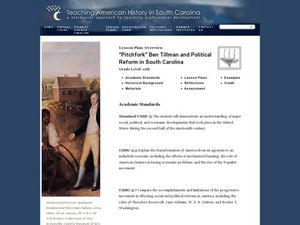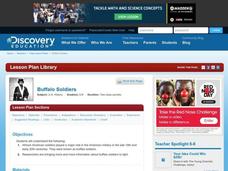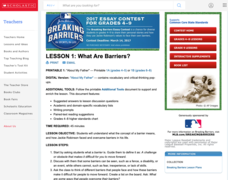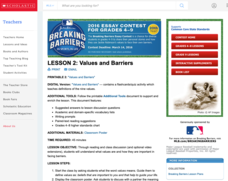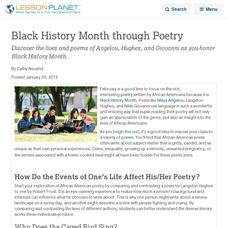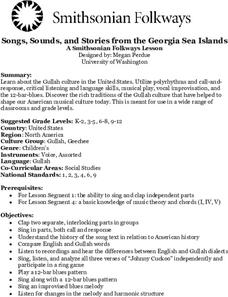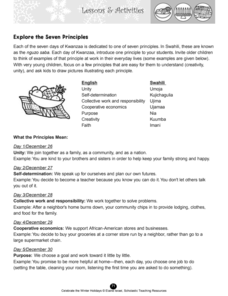Curated OER
"Pitchfork" Ben Tillman and Political Reform in South Carolina
Eleventh graders examine the political reform movement in South Carolina spearheaded by "Pitchfork" Ben Tillman. In this South Carolina history instructional activity, 11th graders examine primary and secondary sources regarding Tillman...
Curated OER
Buffalo Soldiers
Middle schoolers investigate the role of the buffalo soldiers. In this African American history lesson, students research the African American soldiers of the 19th and 20th centuries. Middle schoolers discuss their findings and compose...
Curated OER
Countries of Africa
Students investigate the different countries of Africa. In this African geography lesson, students choose an African country to investigate and construct the country's flag. Students use a map of Africa to color in their country.
Curated OER
Kensington Mansion: Plantation, Sharecroppers, Tenants
Eleventh graders investigate the significance of the Kensington Mansion. In this South Carolina history lesson plan, 11th graders take field trips to the mansion and research primary and secondary sources about plantations,...
Center for History Education
Fighting for Whose Freedom? Black Soldiers in the American Revolution
Fight for freedom! The activity delves into the world of African American soldiers during the American Revolution. Scholars read documents, such as the Dunmore Proclamation, to understand how the British government treated African...
John F. Kennedy Center
Musical Harlem: How Is Jazz Music Reflective of the Harlem Renaissance?
Bring jazz music and the Harlem Renaissance to light with a instructional activity that challenges scholars to research and create. Pupils delve deep into information materials to identify jazz terminology, compare types of jazz and jazz...
Scholastic
Lesson 1: What Are Barriers?
Scholars discuss the concept of a barrier with a short passage on Jackie Robinson. The writing process begins with a paragraph and several other sentences about Robinson's unique traits that made breaking a barrier possible.
Scholastic
Lesson 2: Values and Barriers
Scholars investigate and discuss the importance of values and how they can be used to break barriers. Small groups work collaboratively to examine the text and draw inferences to answer questions. A writing assignment challenges pupils...
John F. Kennedy Center
Harriet Tubman: Secret Messages Through Song
A instructional activity all about Harriet Tubman and the Underground Railroad introduces scholars to African American spirituals. By way of reading, speaking, and listening, learners discover, analyze, and decode African American...
Lesson Planet
Black History Month Through Poetry
Black History Month is a great time to discuss African-American poets in your classroom.
Northern Nevada Council for the Social Studies
What Are the Origins and Influences of Rap Music?
Considered an American art form, rap has its roots in places from Jamaica to the Bronx. Using a series of readings, comprehension questions, and videos, scholars explore the history of rap and its connections to the African diaspora....
Center for History Education
The Untold Story: The Black Struggle for Freedom during the Revolutionary War in Maryland
The American Revolution brought freedom to select groups and ignored others. An enlightening resource highlights the struggle of African Americans during the American Revolution and their efforts to escape slavery. Scholars analyze...
PBS
Free, but Not Free: Life of Free Blacks Before the Civil War
Using the family stories of a famous comedian and singer-songwriter, learners consider what life was like for African Americans who were enslaved and free before the Civil War. To complete a concluding activity, they write about the...
National WWII Museum
The Red Ball Express: Statistics as Historical Evidence
Historians use all kinds of information to make conclusions ... including statistics. Young scholars examine how two historians evaluate The Red Ball Express—a supply line staffed primarily by African Americans—using numbers. The...
Smithsonian Institution
Songs, Sounds and Stories from the Georgia Sea Islands
American music is the result of the influence of many cultures, including the traditions brought by the African slaves. Young scholars study the polyrhythms, the call-and-response format, and the vocal improvisations of the Gullah...
Center for History Education
Helping to Move On? An Analysis of the Reconstruction Amendments
Reconstruction amendments: a helping hand or another form of slavery? An inquisitive lesson compares the Reconstruction legislation that ended slavery, granted citizenship, and protected voting right for African American men. Scholars...
Curated OER
Slave Narratives: Constructing U.S. History Through Analyzing Primary Sources
Learners access oral histories that contain slave narratives from the Library of Congress. They describe the lives of former slaves, sample varied individual experiences and make generalizations about their research in journal entries.
Scholastic
Explore the Seven Principles
A lesson shines a spotlight on what makes Kwanzaa special by taking a close look at its seven principles. Gift ideas encourage scholars to make and give one to their family members. Class members celebrate heroes and role models of...
Oklahoma City of Museum Art
Harlem Renaissance
Individuals expressed the Harlem Renaissance in diverse forms of art, ranging from poetry to photography to painting. Learners explore pieces using a carefully curated collection from the Oklahoma City Museum of Art. Included lessons ask...
University of California
Was Slavery Always Racial?
The lesson focuses on slavery in the ancient world and asks academics to decide if it was always about race. Scholars view primary sources, participate in a short discussion, and complete a worksheet to understand how slavery in the...
US National Archives
Documented Rights Educational Lesson Plan
How have groups struggled to have their unalienable rights recognized in the United States? Acting as a research team for the Human Rights Council of the United Nations, your young historians will break into groups to research how people...
Curated OER
Lesson: Emory Douglas: Art and Activism
Visual literacy can be experienced in many different ways. Learners discuss the times, graphic art, and cultural significance of activism in art as they explore artist and Black Panther, Emory Douglas. This is a discussion-based lesson...
Albert Shanker Institute
Who Was Bayard Rustin?
Who was Bayard Rustin? Pupils analyze a series of primary source documents to learn about this important figure in the civil rights movement. The lesson contains a short film to watch along with guiding questions and other resources...
Smithsonian Institution
Native Resistance: Native Resistance Then and Now
Native Americans lost so much—and gained so little in return. Scholars explore Native Americans' resistance to the United States government. The lesson uses primary sources to explore the different forms of protest and gives a voice to...


